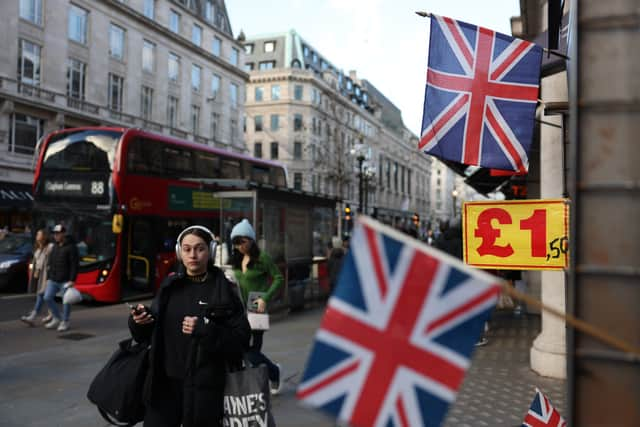What does a recession mean for me? What is a recession, what happens during a recession, how long does it last
and live on Freeview channel 276
Britain's economy went into a recession in late 2023, after output contracted by more than expected in the final three months, according to official figures.
Official numbers from the Office for National Statistics show that the country's overall economic output, known as gross domestic product (GDP), decreased by 0.3% in the last three months of the year.
This follows a 0.1% drop in the three months before that. Since there were two consecutive quarters of GDP decline, the country is now technically in a recession.
It marks the first time the UK has entered recession since the first half of 2020, when the initial Covid-19 lockdown sent the economy plunging into reverse. The figures deal a blow to Prime Minister Rishi Sunak, who has promised to grow the economy as one of his five priorities.
But what exactly is a recession, and most important, what does it mean for you? Here is everything you need to know about it.
What does a recession mean?
A recession is an economic term that refers to a significant decline in a country's economic activity, usually measured by a decrease in the GDP for two consecutive quarters or more.
A recession signifies a period of economic contraction, where businesses produce less, unemployment rises and overall economic activity declines.
It is a widespread downturn that affects various sectors of the economy, leading to reduced consumer spending, lower investment and decreased international trade.
Recessions are often triggered by a combination of factors, such as a decrease in consumer confidence, a decline in investment or external shocks like financial crises or global pandemics.
Chancellor Jeremy Hunt said inflation and high interest rates were behind the UK's current output fall. He said: “While interest rates are high – so the Bank of England can bring inflation down – low growth is not a surprise."


What does a recession mean for me?
For individuals, the impacts of a recession can be significant. During economic downturns, businesses may cut back on hiring or even lay off workers, leading to increased unemployment rates.
Job security becomes a concern for many individuals, and those who are unemployed may find it more challenging to secure new employment opportunities.
Reduced consumer spending and confidence can result in lower wages, making it challenging for individuals to maintain their standard of living and necessary for individuals to adapt their spending habits and budget more carefully.
Additionally, the value of assets, such as homes and investments, may decline, affecting personal wealth.
How bad will it be?
Remember, the UK is only "technically" in a recession, as defined as a decrease in the GDP for two consecutive quarters or more.
Across the year as a whole, the economy actually grew, but by an anaemic 0.1%, down from 4.6% in 2022 and – when stripping out the pandemic-hit plunge seen in 2020 – the weakest growth since the aftermath of the financial crisis in 2009.
A 'Great Depression'-style scenario, characterised by prolonged economic downturn and widespread unemployment, seems unlikely based on the current data and economic indicators.
While the economic growth rate is modest and some sectors are experiencing declines, positive indicators such as rising wages and low unemployment provide reasons for cautious optimism.
How long does a recession last?
The duration of a recession varies based on several factors, making it challenging to predict with certainty - some recessions are short-lived, while others may extend over an extended period.
The interconnected nature of the global economy means that external factors, such as international trade dynamics and the economic health of major trading partners, can impact the duration of a recession.
At home, swift and effective policy measures, such as fiscal stimulus packages and monetary policy adjustments, can help shorten the recessionary period by supporting businesses and consumers.
Despite the UK falling into a recession, Chancellor Jeremy Hunt has insisted the economy is “turning a corner”.
He said: "There are signs the British economy is turning a corner; forecasters agree that growth will strengthen over the next few years, wages are rising faster than prices, mortgage rates are down and unemployment remains low."
But not everyone is convinced, and shadow chancellor Rachel Reeves said the Prime Minister’s promise to grow the economy was “in tatters”.
She said: “The Prime Minister can no longer credibly claim that his plan is working or that he has turned the corner on more than 14 years of economic decline under the Conservatives that has left Britain worse off.
“This is Rishi Sunak’s recession and the news will be deeply worrying for families and business across Britain.”
Comment Guidelines
National World encourages reader discussion on our stories. User feedback, insights and back-and-forth exchanges add a rich layer of context to reporting. Please review our Community Guidelines before commenting.
